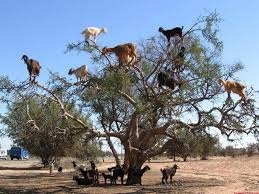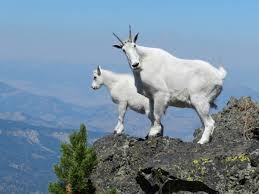The Goats Who Climbed Too High for Grass

The mountain peak, perpetually shrouded in thin, biting air, was the domain of the Goats. They were creatures of incredible agility and tenacity, their small hooves finding purchase on sheer, dizzying slopes where no other beast dared tread. Their ability to ascend was unmatched, but their ambition was a corrosive, self-defeating obsession.
These were the Goats Who Climbed Too High for Grass. They symbolized ambitious organizations, individuals, or political entities who pursue extreme, high-risk goals (e.g., radical ideological purity, unsustainable growth, or unreachable political heights), often sacrificing essential resources or practical needs for the sake of symbolic ascent or maintaining an impractical elevation.
Their power was their position, but their weakness was the barrenness of their environment.
Their leader, the grizzled, hook-horned King Zenith, embodied this self-destructive ambition. Zenith insisted that true legitimacy and safety lay only at the highest possible point. He believed that the low-lying valleys, with their lush meadows and gentle streams, were places of weakness, temptation, and inevitable compromise.

The Barren Summit
The Goats' "kingdom" was the jagged rock face and the slivers of icy scree near the summit. While they could stand on the highest points, the price was crippling. The Grass—the necessary sustenance, representing practical resources, accessible markets, and stable communities—was far below, in the rich foothills they had abandoned.
Their entire existence became a struggle to sustain an unsustainable position. They had to constantly expend massive energy just to maintain their footing in the thin air, leaving little strength for anything else.
They viewed the other creatures from a position of arrogant superiority. They saw the Bulls and Stallions fighting over the messy, fertile valleys as primitive. They dismissed the slow, methodical work of the Bees and the Ants as mundane. Only the Eagles, who shared their altitude, were given grudging respect, though the Goats envied the Eagles’ effortless flight.
The Goats' greatest enemy was not a rival beast, but gravity and starvation.
Their rigid, high-altitude ideology meant they were constantly purging their ranks of those who showed "weakness"—Goats who suggested descending for a proper meal or who proposed trading rock salt for grass. These pragmatists were quickly labeled "Low-Ground Sympathizers" and driven off the peaks, ensuring that only the most fanatical climbers remained.

The Summit's Illusion
A few seasons ago, the Goats had reached their highest objective: a treacherous, isolated needle of rock known as the Cloud Spire. This pinnacle was utterly barren, but it offered a breathtaking, unparalleled view. Zenith claimed that by reaching the Spire, they had achieved "Ultimate Purity" and were now safe from the "corruption of the plains."
The reality was that the Goats were starving. Their numbers, though still intact, were thin and weak. They had nothing to trade, nothing to produce, and their young were struggling to survive on the meager lichen they managed to scrape from the stones.
The crisis became critical when the annual Desert Wind began to blow. This powerful, scouring wind (economic recession/natural disaster) was a regular threat, but this year it was stronger. The Goats, already weak, found it nearly impossible to maintain their precarious positions.
Zenith, faced with the existential crisis, did not consider descent. Instead, he issued a desperate decree: the "Great Scrape Initiative." He ordered all remaining Goats to focus solely on scraping the highest, most difficult-to-reach patches of lichen, no matter the danger, arguing that this shared suffering proved their "collective resolve and ideological superiority."
The Price of Altitude
The decision was pure self-sabotage. The energy expended to reach the few, tiny patches of lichen far outweighed the nutritional gain, accelerating their collective decline.
Meanwhile, in the foothills they scorned, the Rabbits and the Squirrels—small, pragmatic creatures who had once been oppressed by the Goats—were thriving. They had formed a stable, local economy, trading grass and nuts, and had even built simple, sturdy shelters that protected them from the wind.
The Goats' old territory, the rich middle slopes, was currently unoccupied. The Hedgehogs, sensing a power vacuum and relying on their non-confrontational defense, had quietly begun to move in, securing the few low-lying caves and building up their own small, self-contained strongholds near where the grass began.
The Goats were so focused on their internal struggle for "Purity of Altitude" that they entirely missed the external threat: the silent, permanent occupation of their vital middle-ground territory by a creature too prickly and insignificant to merit a descent.
The situation became impossible when a small herd of the younger Goats—those who remembered the taste of fresh grass—finally decided to defect. Led by a pragmatic young female named Sierra, they launched a desperate descent, hoping to escape the wind and the starvation.
Zenith, spotting the defection, went into a furious rage. He focused all his remaining energy not on weathering the wind or finding food, but on shrieking insults and threats at the retreating Sierra and her group, declaring them "traitors who sold their souls for comfort." His actions, and the defensive posture of his remaining followers, did nothing but further destabilize the thin air around them.
The Isolation of the Ideal
Sierra and her small band reached the middle slopes, battered but alive. They found the terrain occupied by the silent, prickly Hedgehogs. The Hedgehogs, unwilling to fight and unwilling to share, simply curled up into defensive balls, their quills a clear, painful deterrent. Sierra realized they were trapped. They couldn't fight their way through the Hedgehogs, and the remaining terrain above was already occupied by Zenith's starving fanatics.
The Goats had traded a vast, practical territory for a tiny, symbolic peak.
As the Desert Wind finally subsided, the sun shone on a new reality. King Zenith and his last, loyal few stood shivering on the Cloud Spire, having survived the wind but now facing inevitable starvation. They had the moral high ground, the purest ideology, and the most magnificent view, but they were isolated, without food, and trapped above the pragmatic, resource-rich world that now belonged to the smaller, more adaptable creatures they had scorned.
The Goats Who Climbed Too High for Grass had proven a bitter lesson: Ideology, when pursued to the exclusion of practical resources, can be the most effective form of self-destruction. They had achieved the perfect summit, but in doing so, they had sacrificed the very ground upon which empires—and lives—are built.
- Questions and Answers
- Opinion
- Motivational and Inspiring Story
- Technology
- Live and Let live
- Focus
- Geopolitics
- Military-Arms/Equipment
- الحماية
- Economy
- Beasts of Nations
- Machine Tools-The “Mother Industry”
- Art
- Causes
- Crafts
- Dance
- Drinks
- Film/Movie
- Fitness
- Food
- الألعاب
- Gardening
- Health
- الرئيسية
- Literature
- Music
- Networking
- أخرى
- Party
- Religion
- Shopping
- Sports
- Theater
- Health and Wellness
- News
- Culture

